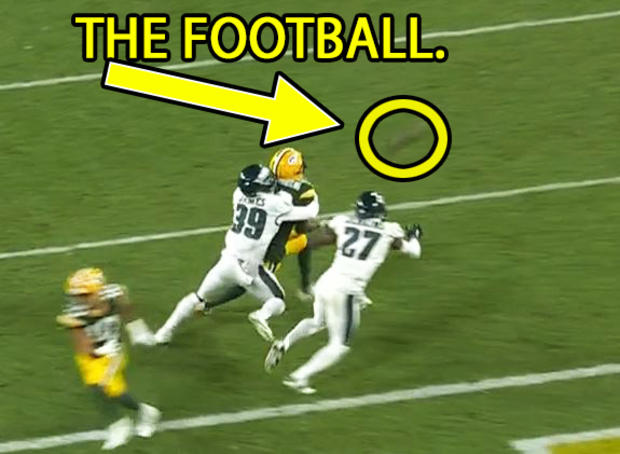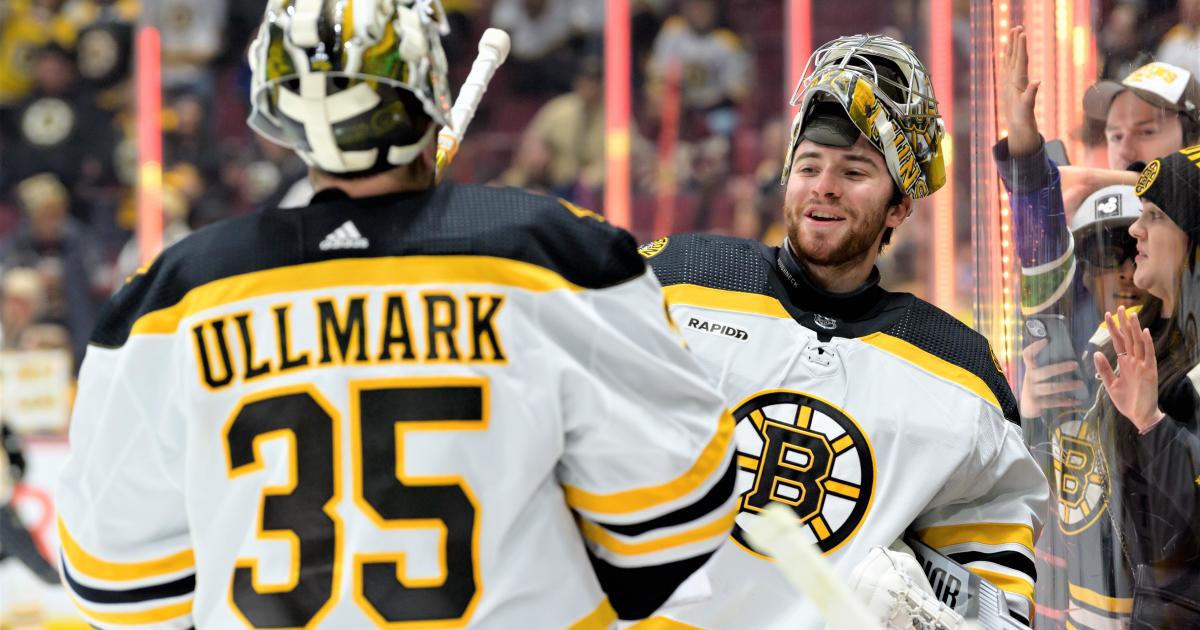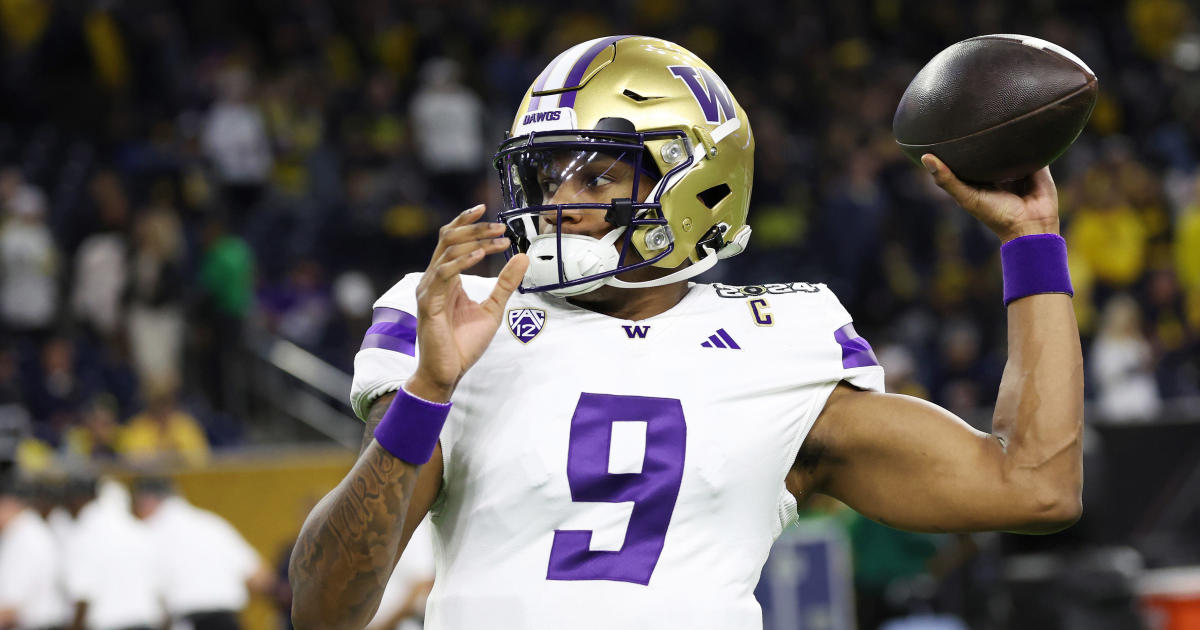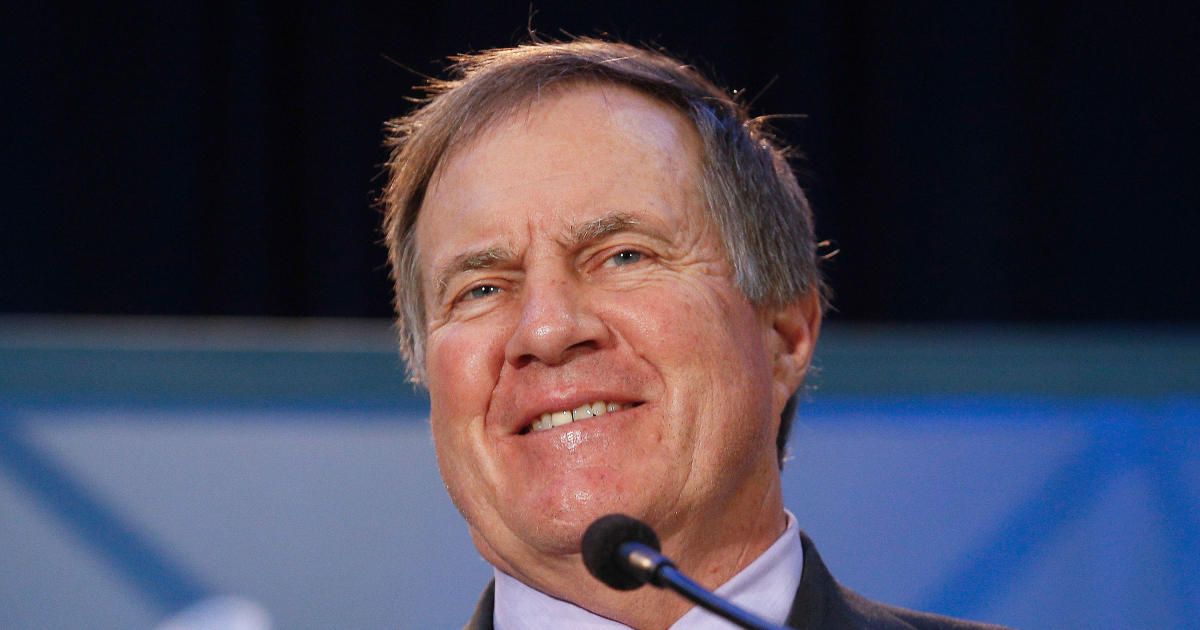Hot Take: NFL's Pass Interference Reviews Are (Mostly) Working
By Michael Hurley, CBS Boston
BOSTON (CBS) -- Human beings love to complain. They're not happy unless they're miserable. If they had nothing to complain about, they'd surely complain about having nothing to complain about.
Complaining is merely a human condition.
It's been no surprise, then, to see the overarching reaction to the NFL's implementation of replay review on pass interference calls and non-calls to be complaints. Lots and lots of complaints. (Human beings also don't like change, making this one a true double whammy.)
That furor reached a fever pitch on Thursday night, as America settled onto the couch to watch Aaron Rodgers and the Green Bay Packers take on the Philadelphia Eagles on national TV.
It didn't take long for the people to get restless.
Some of that was justified. The dirty hit by Derek Barnett that sent Jamaal Williams off on a stretcher was not the reason anybody tuned into the game. Likewise, no viewers appreciated when the officials on the field didn't see (either intentionally or not) a fumble clearly being caused by the ground, thus allowing the Packers to return the loose ball for a touchdown, thus leading to Lambeau Stadium putting on its super sweet light show celebration, thus leading to a replay review and a lengthy commercial break, all because the officials are deathly afraid of being wrong.
That was crazy. If you were mad about that waste of time, then you've got a case.
But some of the anger Thursday night -- that is, the anger geared at the mechanism for replay review of pass interference was not entirely justified.
That's because the new process for reviewing pass interference is ... dare I say ... actually working.
That should be the major takeaway from Thursday night, even after a couple of instances of questionable contact that certainly could have qualified as pass interference but nevertheless was ruled to not be a foul after coach's challenges.
The most egregious instance of the botching of a pass interference call was actually fixed. That should be the main story from Thursday: A touchdown that had been taken off the board for Philadelphia due to bad officiating was retroactively awarded -- rightly -- to Philadelphia. A very bad call that could have/would have cost the Eagles a touchdown was quickly remedied.
Success.
If you can make sure you have this video muted, you can see Zach Ertz clearly not committing pass interference.
The fact that Ertz drew a flag at all in that instance is somewhat problematic for the on-field officials. But the fact that it was corrected without incident? That's encouraging. No teams should be losing touchdowns because of ... that.
And, because it happened on a scoring play (even though the score was negated), it was automatically reviewed. There might be a logical gap there in the automatic review of a scoring play when the score didn't count, but nevertheless, the bad call was corrected without a coach having to throw a challenge flag or risk a timeout.
Good job, NFL.
(Woof. That one hurt to type more than I anticipated. Yeesh. Hold on. Going to need a moment to recover.)
(Yikes.)
(I mean ... YIKES.)
(OK. Let's power through.)
What happened after that was when the anger started to grow. Avonte Maddox clearly made contact with Marquez Valdes-Scantling as the Packers wideout tried to make a catch up the right sideline. Had the officials on the field called pass interference on the play, it would have held up on replay. But in live speed on the field, the officials didn't call pass interference.
So, despite Matt LaFleur's sassy throw of the challenge flag ...
... the ruling on the field stood. People were apoplectic, because they had seen the slow-motion replay that showed the clear contact.
But ... didn't the No. 1 complaint when the new rule was instituted center on the feeling that nobody wanted the game to be ruined by slow-motion replays of every minor bit of contact? Wasn't the hope that the new rule would fix the egregious mistakes (see the earlier Ertz play, or the Saints disaster last year), and leave the rest of the game more or less the way it's been for some time?
That is to say: No, the officials on the field don't get every call right. But they've never gotten every call right. What the addition of replay review can now do is fix the very worst of the missed calls while mostly leaving the rest of the game the same.
That was the clear standard established throughout the preseason, and it's continued through the real games, too.
Somehow, Doug Pederson didn't get that memo, as he threw a challenge flag of his own when he felt that Alshon Jeffery was interfered with by Kevin King on an incomplete pass later in the third quarter. Once again, by the strict letter of the law, and via examination of zoomed-in slow-motion footage, pass interference had technically been committed. But once again, the overriding standard of only correcting egregious mistakes was applied. The no-call on the field stood.
If these decisions had been made amidst a number of penalties being enforced after the fact on replay review, then perhaps Pederson and LaFleur could be reasonably miffed about the outcome. But that's not at all what's happening, and it's been pretty clear since about mid-August that the goal of the new rules is not to catch every single possible infraction on the field. It's merely to prevent the nightmare scenario in New Orleans from ever happening again. Everything else? Well, that's football.
(It is at this point that we must do the "yeah but." And today's "yeah but" centers on the official Twitter account for NFL Officiating sharing a live-speed video shot from the moon to try to explain the non-call.
That's not helping anything here, guys.)
(Feels better to do the "yeah but," if we're being honest.)
All of that being said ... the system may have failed on the final Packers play of the game. Eagles cornerback Craig James made contact with Valdes-Scantling a tick early, leading to a deflected pass and, ultimately, the game-losing interception for Green Bay.
Maybe.
In a still image posted on Twitter, or right here ...
... it could look like clear PI. But in real life, the contact was not as severe as the still image might suggest.
Regardless, a play like that should have triggered an automatic review from the booth, considering it took place inside of the final two minutes of the fourth quarter. If they reviewed and deemed it to not have been a case of PI, then so be it. But not reviewing it at all shows that the system still has some serious kinks to work out.
Still, the bottom line is this. Fans of both teams and neutral fans alike can argue till the cows come home on whether some of the plays in Thursday night's game should have been penalized for pass interference. That's been part of football forever, and it appears as though it's going to stick around longer.
What's changed is that a very bad penalty that would have wiped a touchdown off the board was looked at and quickly rectified without incident. A touchdown that should have counted ... ended up counting.
That's the main goal of all these new rules. Don't get caught up in the exhilaration of complaining to forget that.
You can email Michael Hurley or find him on Twitter @michaelFhurley.




